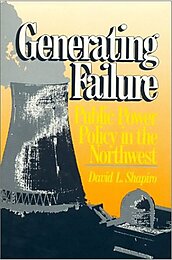In 1993 the establishment of the Tennesse Valley Authority ushered in a new age for American energy policy, one in which the federal government supplanted private industry as the primary provider of power for much of the nation. In 1937 the Bonneville Power Administration was established in the Northwest with the mandate of transmitting and marketing power from the Bonneville Dam on the Columbia River. Eventually BPA became responsible for all federal power facilities in the Northwest.
In Generating Failure: Public Power Policy in the Northwest, economist David L. Shapiro exposes the policy disasters caused by the public power system (WPPSS, or Whoops) default on $2.25 billion worth of municipal bonds — the largest such default in America’s history — was due to reckless mismanagement by BPA. He also demonstrates how political maneuvering continues to jeopardize the stability of the power industry.
Shapiro concludes that the problems are systemic; BPA is a prime example of a federal agency that has grossly exceeded its initial charter and pursued an independent course at the expense of taxpayers and the constituents it was intended to serve. His solution is to privatize the agency and restore the responsibility of energy provision in the Northwest—and throughout the nation—to the private sector. Foreword by William A. Niskanen.
